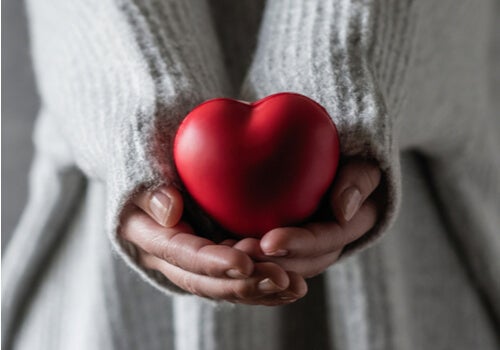The Art of Self-Compassion

Most people are very critical and hard on themselves. This is true especially when you think you’re lacking in something or have some sort of defect. People usually mistreat themselves when they’ve made a mistake, thinking that it will improve things. In the end, though, it doesn’t make things better at all but self-compassion does.
Self-compassion is an alternative to self-criticism and mistreatment that helps you grow. It consists of treating yourself kindly and recognizing that you have things in common with the rest of humanity. But it’s also about accepting your own limitations.
According to American psychologist Kristin Neff, one of the top researchers in her field, self-compassion has three fundamental aspects:
- Kindness toward yourself.
- Recognition of your own humanity.
- Focused attention.

Kindness toward yourself
Feelings of kindness toward yourself not only change your mind but also change your body.
When you calm your pain, you appeal to the attachment system that all mammals have. One of the most important functions of this system is the release of oxytocin, a hormone that increases your feelings of trust. It also makes you feel peaceful, safe, generous, and connected and increases your capacity to feel self-affection and compassion.
Kindness toward yourself lets you treat yourself as a valuable human being, deserving of affection.
Marshall Rosenberg, author of Nonviolent Communication: A Language of Life, emphasizes the importance of using empathetic and not critical language when you talk to yourself. It’s all about treating yourself well, not badly, with an understanding attitude.
Recognize your common humanity
The feeling of compassion surges from the recognition that the human experience is imperfect. Compassion toward yourself consists of recognizing that all humans can fail.
When you’re in contact with your common humanity, remember that suffering is shared. Everyone suffers and feels pain at some point in their lives.
Being self-compassionate isn’t the same as feeling sorry for yourself. Self-compassion leads you to understand the situation better and in a kinder way. This leads you to find better solutions for your own improvement.
Tara Brach explains: “Feeling that you don’t have any merit goes hand-in-hand with feeling removed from everyone else, removed from life. If we’re imperfect, how can we feel part of a community? It seems to be a vicious cycle; the more useless we feel, the more removed and vulnerable we feel”.
Feelings of connection with others, such as kindness, activate your attachment system in the brain. People who feel connected to others fear adverse circumstances less and respond with more flexibility to life’s challenges.

Cultivating focused attention
The third key element for practicing self-compassion is focused attention or mindfulness. Living in the present with acceptance and without judgment leads you to a clearer perspective of your suffering.
Practicing mindfulness also helps you to recognize how you feel and identify the emotions and thoughts as they are, without letting them define you.
It’s about observing what’s happening in your conscious and the here and now. This lets you identify thoughts about the past and the future exactly as they are: thoughts.
In addition, mindfulness gives you tools for responding to different situations from a state of peace and relaxation. Thanks to this, you won’t react too dramatically and will avoid consequences you might regret in the future.
When you really look at it, being self-compassionate is a constant exercise in self-kindness that should never end. You should cultivate it during your entire life.
Most people are very critical and hard on themselves. This is true especially when you think you’re lacking in something or have some sort of defect. People usually mistreat themselves when they’ve made a mistake, thinking that it will improve things. In the end, though, it doesn’t make things better at all but self-compassion does.
Self-compassion is an alternative to self-criticism and mistreatment that helps you grow. It consists of treating yourself kindly and recognizing that you have things in common with the rest of humanity. But it’s also about accepting your own limitations.
According to American psychologist Kristin Neff, one of the top researchers in her field, self-compassion has three fundamental aspects:
- Kindness toward yourself.
- Recognition of your own humanity.
- Focused attention.

Kindness toward yourself
Feelings of kindness toward yourself not only change your mind but also change your body.
When you calm your pain, you appeal to the attachment system that all mammals have. One of the most important functions of this system is the release of oxytocin, a hormone that increases your feelings of trust. It also makes you feel peaceful, safe, generous, and connected and increases your capacity to feel self-affection and compassion.
Kindness toward yourself lets you treat yourself as a valuable human being, deserving of affection.
Marshall Rosenberg, author of Nonviolent Communication: A Language of Life, emphasizes the importance of using empathetic and not critical language when you talk to yourself. It’s all about treating yourself well, not badly, with an understanding attitude.
Recognize your common humanity
The feeling of compassion surges from the recognition that the human experience is imperfect. Compassion toward yourself consists of recognizing that all humans can fail.
When you’re in contact with your common humanity, remember that suffering is shared. Everyone suffers and feels pain at some point in their lives.
Being self-compassionate isn’t the same as feeling sorry for yourself. Self-compassion leads you to understand the situation better and in a kinder way. This leads you to find better solutions for your own improvement.
Tara Brach explains: “Feeling that you don’t have any merit goes hand-in-hand with feeling removed from everyone else, removed from life. If we’re imperfect, how can we feel part of a community? It seems to be a vicious cycle; the more useless we feel, the more removed and vulnerable we feel”.
Feelings of connection with others, such as kindness, activate your attachment system in the brain. People who feel connected to others fear adverse circumstances less and respond with more flexibility to life’s challenges.

Cultivating focused attention
The third key element for practicing self-compassion is focused attention or mindfulness. Living in the present with acceptance and without judgment leads you to a clearer perspective of your suffering.
Practicing mindfulness also helps you to recognize how you feel and identify the emotions and thoughts as they are, without letting them define you.
It’s about observing what’s happening in your conscious and the here and now. This lets you identify thoughts about the past and the future exactly as they are: thoughts.
In addition, mindfulness gives you tools for responding to different situations from a state of peace and relaxation. Thanks to this, you won’t react too dramatically and will avoid consequences you might regret in the future.
When you really look at it, being self-compassionate is a constant exercise in self-kindness that should never end. You should cultivate it during your entire life.
All cited sources were thoroughly reviewed by our team to ensure their quality, reliability, currency, and validity. The bibliography of this article was considered reliable and of academic or scientific accuracy.
- Neff, K. (2012). Sé amable contigo mismo. Paidós: Barcelona.
This text is provided for informational purposes only and does not replace consultation with a professional. If in doubt, consult your specialist.







